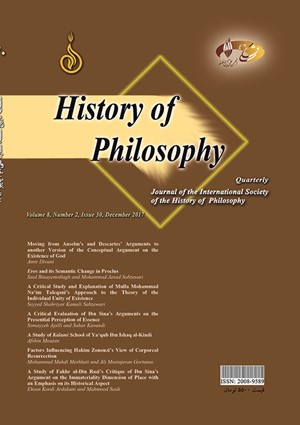-
-
List of Articles
-
Open Access Article
1 - A Critical Evaluation of Ibn Sina’s Arguments on the Presential Perception of Essence
somayyeh ajalli sahar kavandi -
Open Access Article
2 - A Study of Fakhr al-Din Razi’s Critique of Ibn Sina’s Argument on the Immateriality Dimension of Place with an Emphasis on its Historical Aspect
ehsan kordi ardakani Mahmood Seidi -
Open Access Article
3 - A Study of Kalami School of Ya‘qub Ibn Ishaq al-Kindi
Afshin Mo’azzen -
Open Access Article
4 - foreword
Hossein Kalbasi Ashtari -
Open Access Article
5 - Moving from Anselm’s and Descartes’ Arguments to another Version of the Conceptual Argument on the Existence of God
Amir Divani -
Open Access Article
6 - Eros and its Semantic Change in Proclus
-
Open Access Article
7 - Eros and its Semantic Change in Proclus
Said Binayemotlagh Mohammad Javad Sabzevari -
Open Access Article
8 - A Critical Study and Explanation of Mulla Mohammad Na‘im Taleqani’s Approach to the Theory of the Individual Unity of Existence
Seyyed Shahriyar Kamali Sabzewari -
Open Access Article
9 - Factors Influencing Hakim Zonouzi’s View of Corporeal Resurrection
Mohammad Mahdi Meshkati Ali Mostajeran Gortanee
-
The rights to this website are owned by the Raimag Press Management System.
Copyright © 2017-2026







